Artificial Intelligence: Analyzing Advancements, Legal Aspects, Ethics
VerifiedAdded on 2023/05/31
|6
|1106
|250
Essay
AI Summary
This essay provides a comprehensive analysis of the impacts of artificial intelligence (AI) across various sectors. It begins by highlighting the advancements in AI within transportation, medicine, criminal justice, and advertising, noting how AI-driven technologies are transforming these industries. The essay then delves into the legal liabilities associated with AI systems, categorizing potential responsible parties such as algorithm creators, sample data suppliers, and system operators. It emphasizes the need for robust legal procedures to address failures in AI systems. Furthermore, the essay explores the ethical consequences of big data and data analytics, focusing on the potential for reputational and economic losses due to unethical practices. It concludes by advocating for proper legal frameworks to support and guide the AI sector, ensuring that legal implications are addressed effectively. Desklib offers a variety of resources, including solved assignments and past papers, to aid students in their academic pursuits.
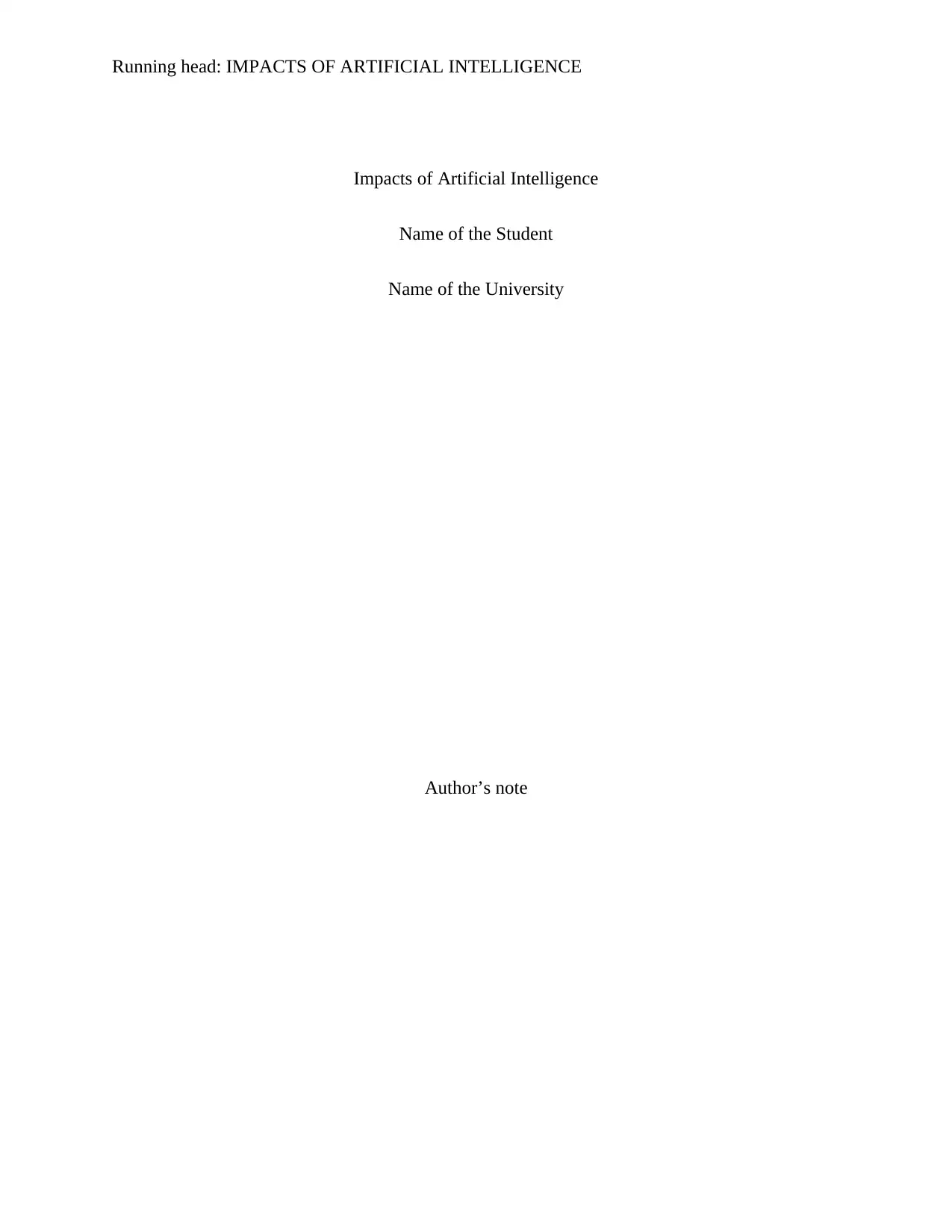
Running head: IMPACTS OF ARTIFICIAL INTELLIGENCE
Impacts of Artificial Intelligence
Name of the Student
Name of the University
Author’s note
Impacts of Artificial Intelligence
Name of the Student
Name of the University
Author’s note
Paraphrase This Document
Need a fresh take? Get an instant paraphrase of this document with our AI Paraphraser
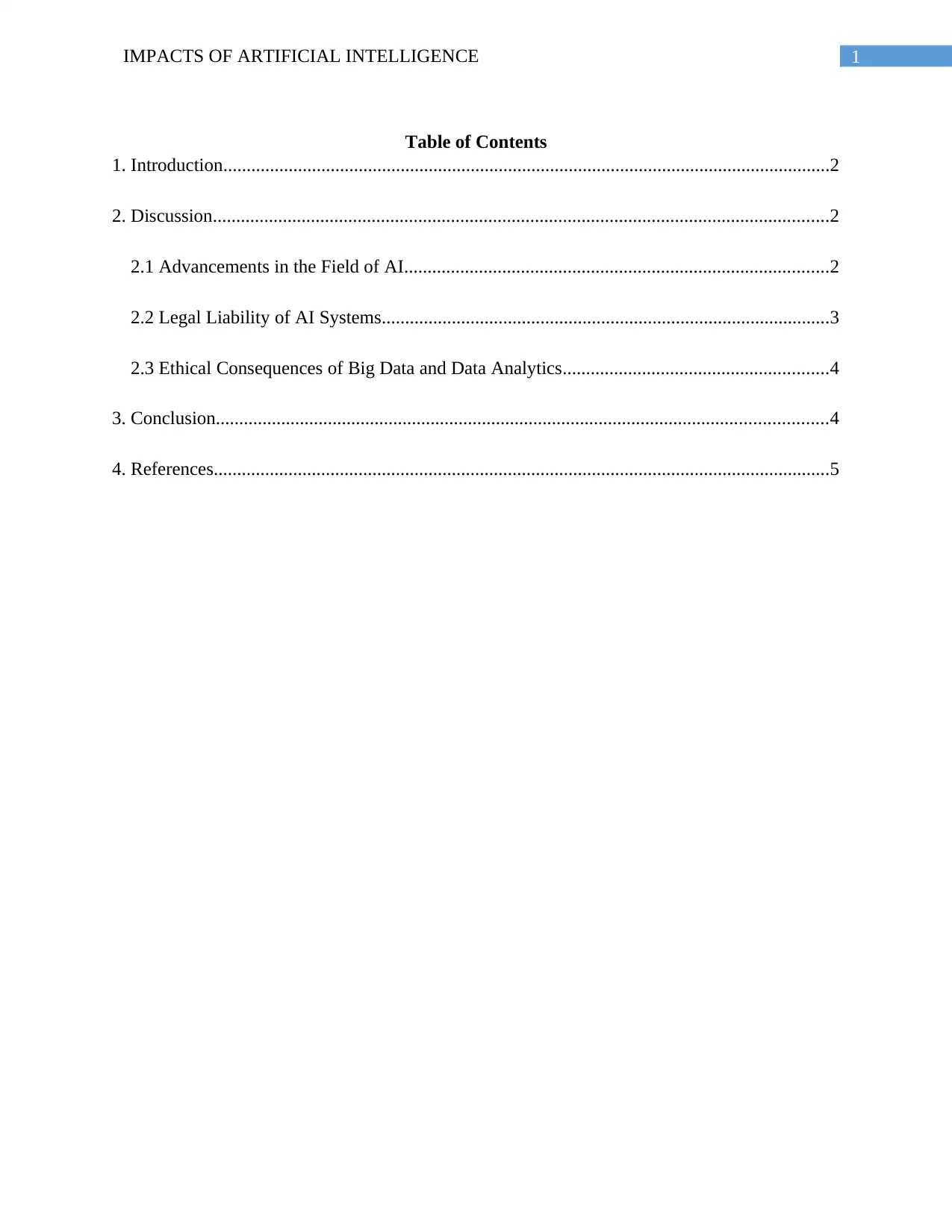
1IMPACTS OF ARTIFICIAL INTELLIGENCE
Table of Contents
1. Introduction..................................................................................................................................2
2. Discussion....................................................................................................................................2
2.1 Advancements in the Field of AI...........................................................................................2
2.2 Legal Liability of AI Systems................................................................................................3
2.3 Ethical Consequences of Big Data and Data Analytics.........................................................4
3. Conclusion...................................................................................................................................4
4. References....................................................................................................................................5
Table of Contents
1. Introduction..................................................................................................................................2
2. Discussion....................................................................................................................................2
2.1 Advancements in the Field of AI...........................................................................................2
2.2 Legal Liability of AI Systems................................................................................................3
2.3 Ethical Consequences of Big Data and Data Analytics.........................................................4
3. Conclusion...................................................................................................................................4
4. References....................................................................................................................................5
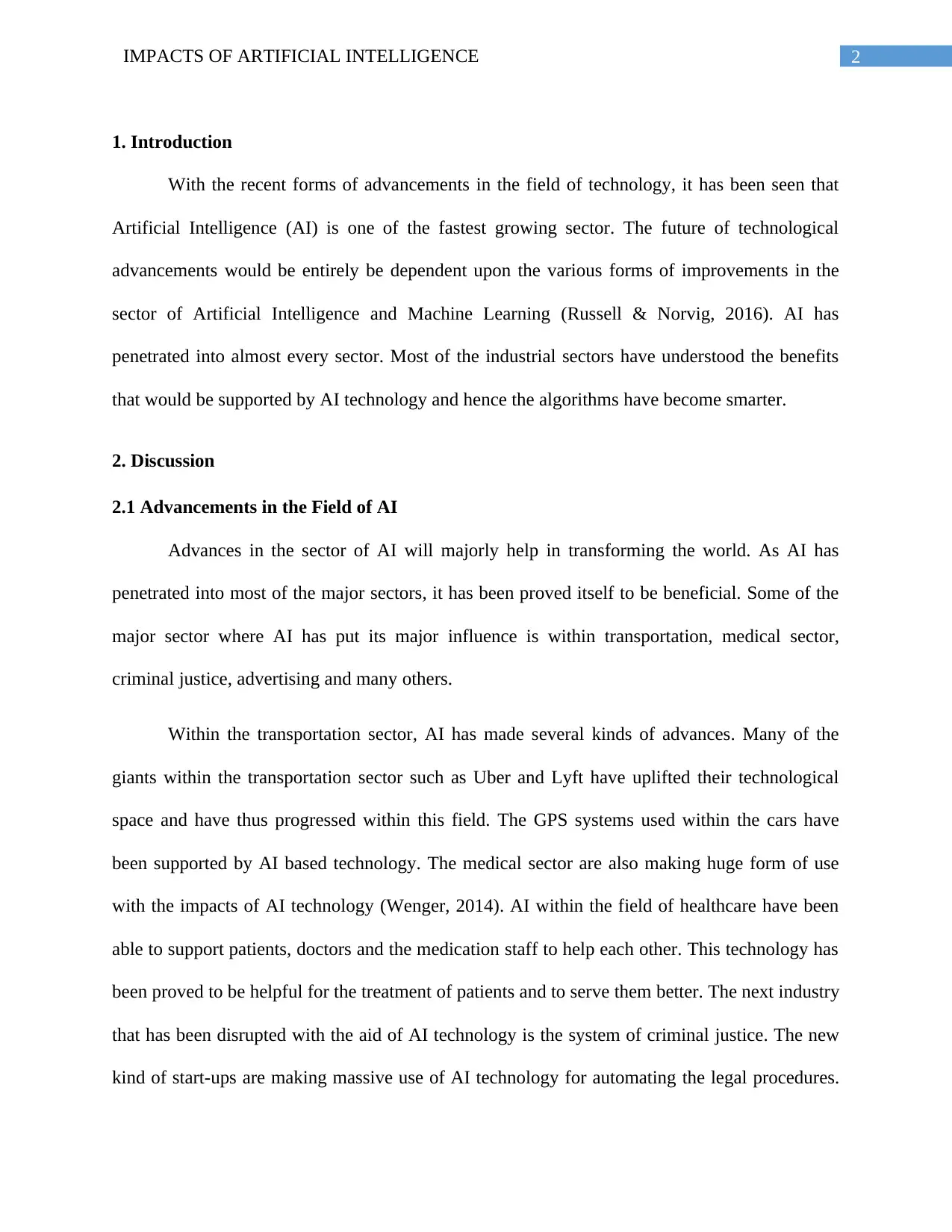
2IMPACTS OF ARTIFICIAL INTELLIGENCE
1. Introduction
With the recent forms of advancements in the field of technology, it has been seen that
Artificial Intelligence (AI) is one of the fastest growing sector. The future of technological
advancements would be entirely be dependent upon the various forms of improvements in the
sector of Artificial Intelligence and Machine Learning (Russell & Norvig, 2016). AI has
penetrated into almost every sector. Most of the industrial sectors have understood the benefits
that would be supported by AI technology and hence the algorithms have become smarter.
2. Discussion
2.1 Advancements in the Field of AI
Advances in the sector of AI will majorly help in transforming the world. As AI has
penetrated into most of the major sectors, it has been proved itself to be beneficial. Some of the
major sector where AI has put its major influence is within transportation, medical sector,
criminal justice, advertising and many others.
Within the transportation sector, AI has made several kinds of advances. Many of the
giants within the transportation sector such as Uber and Lyft have uplifted their technological
space and have thus progressed within this field. The GPS systems used within the cars have
been supported by AI based technology. The medical sector are also making huge form of use
with the impacts of AI technology (Wenger, 2014). AI within the field of healthcare have been
able to support patients, doctors and the medication staff to help each other. This technology has
been proved to be helpful for the treatment of patients and to serve them better. The next industry
that has been disrupted with the aid of AI technology is the system of criminal justice. The new
kind of start-ups are making massive use of AI technology for automating the legal procedures.
1. Introduction
With the recent forms of advancements in the field of technology, it has been seen that
Artificial Intelligence (AI) is one of the fastest growing sector. The future of technological
advancements would be entirely be dependent upon the various forms of improvements in the
sector of Artificial Intelligence and Machine Learning (Russell & Norvig, 2016). AI has
penetrated into almost every sector. Most of the industrial sectors have understood the benefits
that would be supported by AI technology and hence the algorithms have become smarter.
2. Discussion
2.1 Advancements in the Field of AI
Advances in the sector of AI will majorly help in transforming the world. As AI has
penetrated into most of the major sectors, it has been proved itself to be beneficial. Some of the
major sector where AI has put its major influence is within transportation, medical sector,
criminal justice, advertising and many others.
Within the transportation sector, AI has made several kinds of advances. Many of the
giants within the transportation sector such as Uber and Lyft have uplifted their technological
space and have thus progressed within this field. The GPS systems used within the cars have
been supported by AI based technology. The medical sector are also making huge form of use
with the impacts of AI technology (Wenger, 2014). AI within the field of healthcare have been
able to support patients, doctors and the medication staff to help each other. This technology has
been proved to be helpful for the treatment of patients and to serve them better. The next industry
that has been disrupted with the aid of AI technology is the system of criminal justice. The new
kind of start-ups are making massive use of AI technology for automating the legal procedures.
⊘ This is a preview!⊘
Do you want full access?
Subscribe today to unlock all pages.

Trusted by 1+ million students worldwide
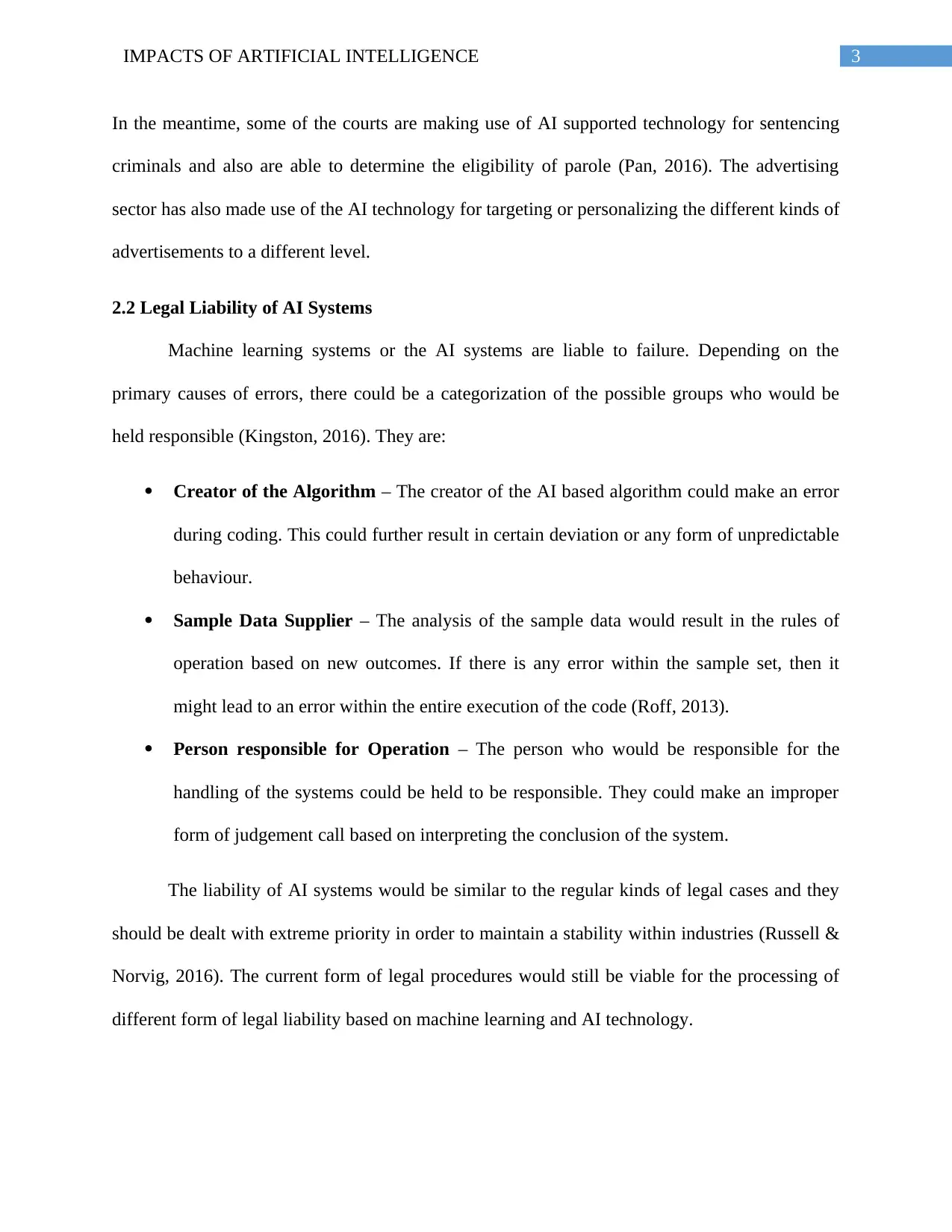
3IMPACTS OF ARTIFICIAL INTELLIGENCE
In the meantime, some of the courts are making use of AI supported technology for sentencing
criminals and also are able to determine the eligibility of parole (Pan, 2016). The advertising
sector has also made use of the AI technology for targeting or personalizing the different kinds of
advertisements to a different level.
2.2 Legal Liability of AI Systems
Machine learning systems or the AI systems are liable to failure. Depending on the
primary causes of errors, there could be a categorization of the possible groups who would be
held responsible (Kingston, 2016). They are:
Creator of the Algorithm – The creator of the AI based algorithm could make an error
during coding. This could further result in certain deviation or any form of unpredictable
behaviour.
Sample Data Supplier – The analysis of the sample data would result in the rules of
operation based on new outcomes. If there is any error within the sample set, then it
might lead to an error within the entire execution of the code (Roff, 2013).
Person responsible for Operation – The person who would be responsible for the
handling of the systems could be held to be responsible. They could make an improper
form of judgement call based on interpreting the conclusion of the system.
The liability of AI systems would be similar to the regular kinds of legal cases and they
should be dealt with extreme priority in order to maintain a stability within industries (Russell &
Norvig, 2016). The current form of legal procedures would still be viable for the processing of
different form of legal liability based on machine learning and AI technology.
In the meantime, some of the courts are making use of AI supported technology for sentencing
criminals and also are able to determine the eligibility of parole (Pan, 2016). The advertising
sector has also made use of the AI technology for targeting or personalizing the different kinds of
advertisements to a different level.
2.2 Legal Liability of AI Systems
Machine learning systems or the AI systems are liable to failure. Depending on the
primary causes of errors, there could be a categorization of the possible groups who would be
held responsible (Kingston, 2016). They are:
Creator of the Algorithm – The creator of the AI based algorithm could make an error
during coding. This could further result in certain deviation or any form of unpredictable
behaviour.
Sample Data Supplier – The analysis of the sample data would result in the rules of
operation based on new outcomes. If there is any error within the sample set, then it
might lead to an error within the entire execution of the code (Roff, 2013).
Person responsible for Operation – The person who would be responsible for the
handling of the systems could be held to be responsible. They could make an improper
form of judgement call based on interpreting the conclusion of the system.
The liability of AI systems would be similar to the regular kinds of legal cases and they
should be dealt with extreme priority in order to maintain a stability within industries (Russell &
Norvig, 2016). The current form of legal procedures would still be viable for the processing of
different form of legal liability based on machine learning and AI technology.
Paraphrase This Document
Need a fresh take? Get an instant paraphrase of this document with our AI Paraphraser
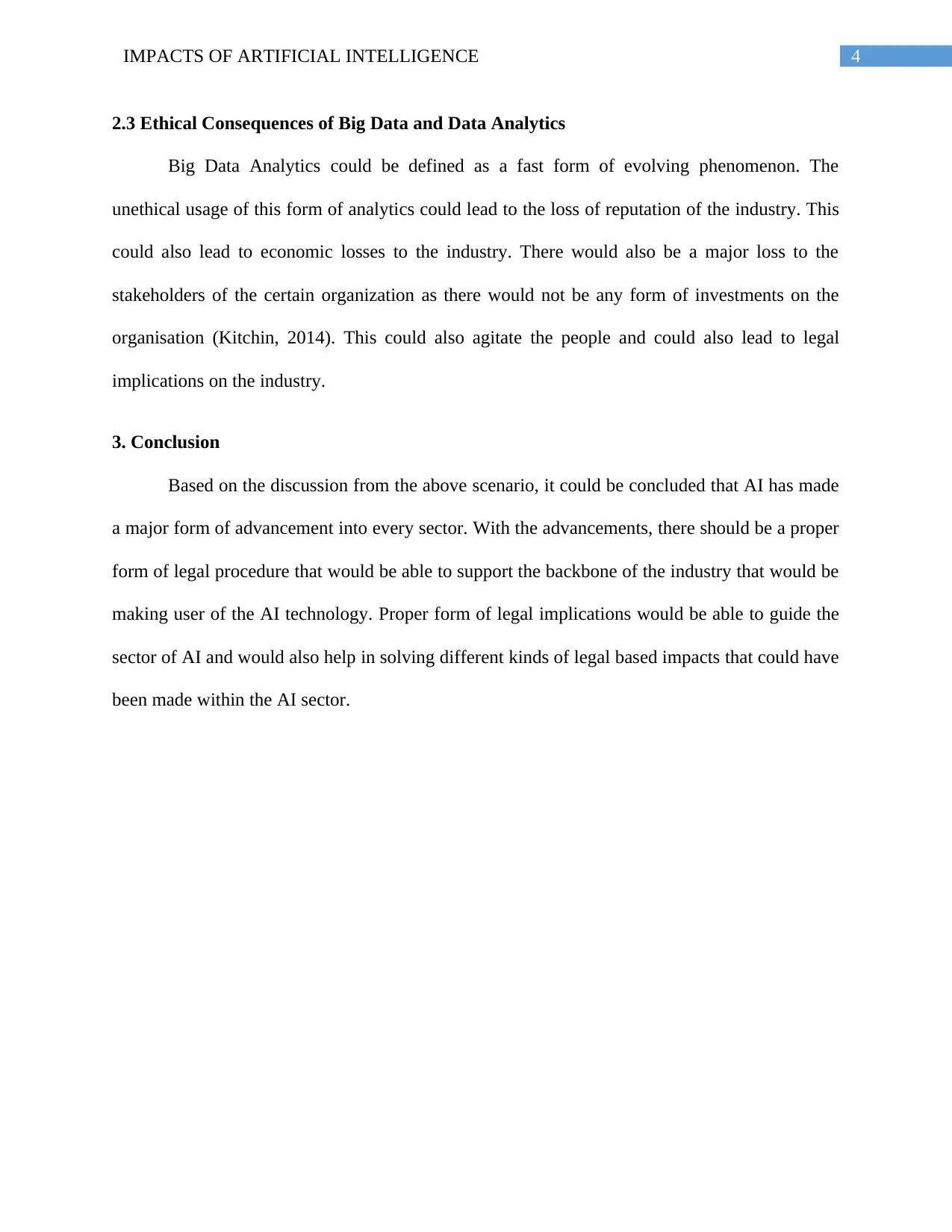
4IMPACTS OF ARTIFICIAL INTELLIGENCE
2.3 Ethical Consequences of Big Data and Data Analytics
Big Data Analytics could be defined as a fast form of evolving phenomenon. The
unethical usage of this form of analytics could lead to the loss of reputation of the industry. This
could also lead to economic losses to the industry. There would also be a major loss to the
stakeholders of the certain organization as there would not be any form of investments on the
organisation (Kitchin, 2014). This could also agitate the people and could also lead to legal
implications on the industry.
3. Conclusion
Based on the discussion from the above scenario, it could be concluded that AI has made
a major form of advancement into every sector. With the advancements, there should be a proper
form of legal procedure that would be able to support the backbone of the industry that would be
making user of the AI technology. Proper form of legal implications would be able to guide the
sector of AI and would also help in solving different kinds of legal based impacts that could have
been made within the AI sector.
2.3 Ethical Consequences of Big Data and Data Analytics
Big Data Analytics could be defined as a fast form of evolving phenomenon. The
unethical usage of this form of analytics could lead to the loss of reputation of the industry. This
could also lead to economic losses to the industry. There would also be a major loss to the
stakeholders of the certain organization as there would not be any form of investments on the
organisation (Kitchin, 2014). This could also agitate the people and could also lead to legal
implications on the industry.
3. Conclusion
Based on the discussion from the above scenario, it could be concluded that AI has made
a major form of advancement into every sector. With the advancements, there should be a proper
form of legal procedure that would be able to support the backbone of the industry that would be
making user of the AI technology. Proper form of legal implications would be able to guide the
sector of AI and would also help in solving different kinds of legal based impacts that could have
been made within the AI sector.
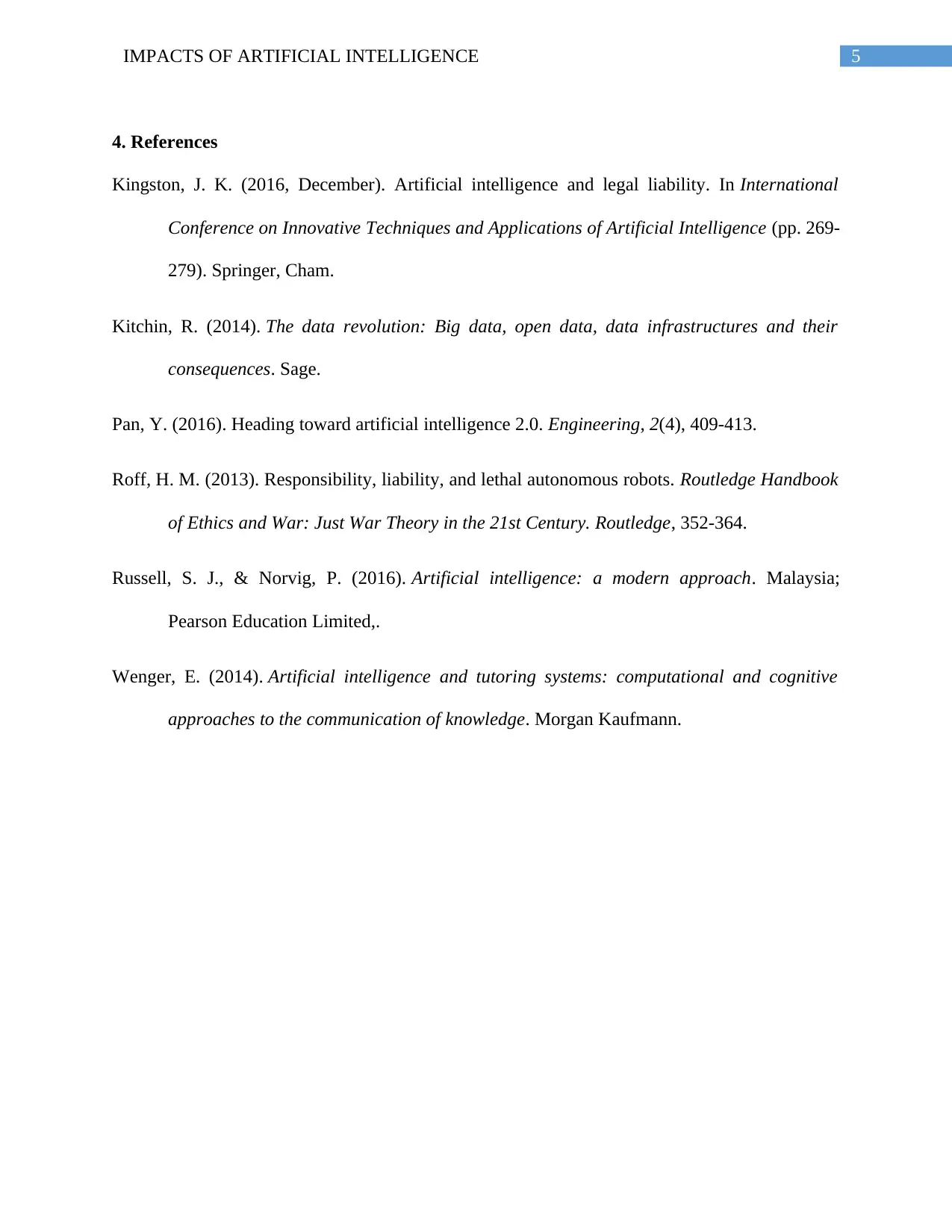
5IMPACTS OF ARTIFICIAL INTELLIGENCE
4. References
Kingston, J. K. (2016, December). Artificial intelligence and legal liability. In International
Conference on Innovative Techniques and Applications of Artificial Intelligence (pp. 269-
279). Springer, Cham.
Kitchin, R. (2014). The data revolution: Big data, open data, data infrastructures and their
consequences. Sage.
Pan, Y. (2016). Heading toward artificial intelligence 2.0. Engineering, 2(4), 409-413.
Roff, H. M. (2013). Responsibility, liability, and lethal autonomous robots. Routledge Handbook
of Ethics and War: Just War Theory in the 21st Century. Routledge, 352-364.
Russell, S. J., & Norvig, P. (2016). Artificial intelligence: a modern approach. Malaysia;
Pearson Education Limited,.
Wenger, E. (2014). Artificial intelligence and tutoring systems: computational and cognitive
approaches to the communication of knowledge. Morgan Kaufmann.
4. References
Kingston, J. K. (2016, December). Artificial intelligence and legal liability. In International
Conference on Innovative Techniques and Applications of Artificial Intelligence (pp. 269-
279). Springer, Cham.
Kitchin, R. (2014). The data revolution: Big data, open data, data infrastructures and their
consequences. Sage.
Pan, Y. (2016). Heading toward artificial intelligence 2.0. Engineering, 2(4), 409-413.
Roff, H. M. (2013). Responsibility, liability, and lethal autonomous robots. Routledge Handbook
of Ethics and War: Just War Theory in the 21st Century. Routledge, 352-364.
Russell, S. J., & Norvig, P. (2016). Artificial intelligence: a modern approach. Malaysia;
Pearson Education Limited,.
Wenger, E. (2014). Artificial intelligence and tutoring systems: computational and cognitive
approaches to the communication of knowledge. Morgan Kaufmann.
⊘ This is a preview!⊘
Do you want full access?
Subscribe today to unlock all pages.

Trusted by 1+ million students worldwide
1 out of 6
Related Documents
Your All-in-One AI-Powered Toolkit for Academic Success.
+13062052269
info@desklib.com
Available 24*7 on WhatsApp / Email
![[object Object]](/_next/static/media/star-bottom.7253800d.svg)
Unlock your academic potential
Copyright © 2020–2026 A2Z Services. All Rights Reserved. Developed and managed by ZUCOL.




